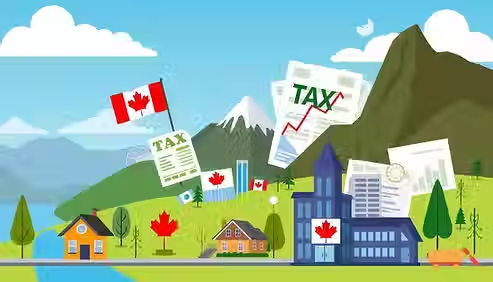A Beginner’s Guide to Passive Real Estate Investing
- sasha540
- Jul 11, 2025
- 4 min read
Updated: Jul 12, 2025
Are you curious about building wealth through passive real estate investing? This guide explores the fundamentals of passive investment strategies tailored to Canada’s real estate market. It outlines the options, benefits, risks, and legal considerations to help beginners start their journey confidently.
Key Takeaways:
Explore various types of passive real estate investments in Canada, including REITs, crowdfunding platforms, and limited partnerships.
Understand the advantages of passive investing: diversification, hands-off management, and potential for consistent returns.
Learn about Canadian tax laws, legal frameworks, and compliance requirements for passive real estate investors.
Discover how to build a diversified real estate portfolio aligned with your goals and risk tolerance.
Gain insights into current Canadian market trends and economic indicators to better time your investments.

Understanding Passive Real Estate Investing
Passive real estate investing allows individuals to earn income and long-term returns from real estate without being actively involved in property management. This approach is increasingly popular in Canada, offering a balance between risk mitigation and wealth-building potential.
Types of Passive Real Estate Investments in Canada:
1. REITs (Real Estate Investment Trusts)
REITs are publicly traded companies that invest in income-producing properties. Canadian REITs offer a straightforward way to invest in real estate without owning physical properties. As of 2025, Canadian REITs have continued to provide competitive yields, even amid rising interest rates.
Top-performing Canadian REITs include:
RioCan REIT (REI.UN)
H&R REIT (HR.UN)
Allied Properties REIT (AP.UN)
Dream Industrial REIT (DIR.UN)
Morguard REIT (MRT.UN)
These REITs invest in commercial, industrial, and mixed-use properties across Canada.
2. Real Estate Crowdfunding Platforms
Canadian platforms like FrontFundr, and BuyProperly allow retail investors to participate in real estate projects with as little as $1,000. Most of these platforms are regulated by provincial securities commissions, but due diligence is essential.
3. Limited Partnerships and Syndications
These structures pool funds from multiple investors for larger developments. General partners manage the asset, while limited partners contribute capital passively.
Commonly used in commercial real estate and multifamily housing developments.
Often require a minimum investment of $25,000–$100,000.
Suitable for accredited investors, though some exemptions apply based on income/net worth.

Benefits of Passive Real Estate Investing
Consistent Income: REIT distributions or rent-backed returns.
Capital Appreciation: Especially in high-demand Canadian markets like Toronto, Vancouver, and Calgary.
Diversification: Real estate adds a non-correlated asset class to traditional portfolios.
Low Time Commitment: Professional management eliminates landlord responsibilities.
Accessibility: Options like REITs and crowdfunding allow low-barrier entry.
Building a Diversified Portfolio
A well-rounded Canadian passive real estate portfolio should consider:
Diversification Type | Examples | Benefit |
Asset Allocation | REITs, crowdfunding, LPs | Mitigates market risk |
Geography | Major cities vs. smaller urban centers | Protects against regional downturns |
Property Type | Residential, industrial, mixed-use | Balances income and growth |
Tip: Investing in cities with strong population growth (e.g., Calgary, Halifax) or industrial corridors (e.g., Southern Ontario) can provide more upside.
Legal and Tax Considerations in Canada
Legal Structure
REITs: Governed by securities regulations, with publicly available disclosures.
Crowdfunding: Regulated by provincial securities authorities.
Limited Partnerships: Governed by partnership agreements; seek legal advice before signing.
Canadian Tax Considerations (2025)
Tax Element | Explanation |
Rental Income | Taxable at your marginal tax rate. |
Capital Gains | 50% inclusion rate on gains when properties or REIT units are sold. |
Deductions | Property expenses, mortgage interest, depreciation (CCA), etc. |
⚠️ Capital Cost Allowance (CCA) can defer taxes but may be recaptured upon sale.

Risk Management
Common Risks
Market corrections
Tenant vacancies
Interest rate hikes
Illiquidity (in private investments)
Regulatory changes
Mitigation Strategies
Diversify across regions and property types.
Use professional property managers or vetted platforms.
Maintain cash reserves for vacancies or emergencies.
Insure adequately: property, liability, and rent default insurance are recommended.

Timing and Market Trends (Mid-2025)
Current Market Snapshot:
Indicator | Trend | Impact |
Interest Rates | Stabilizing around 4.75% | Mortgage affordability slowly improving |
Home Prices | Modest recovery in major cities | Potential capital appreciation |
Rental Demand | Increasing across Canada | Strong outlook for income properties |
Population Growth | Record immigration levels | Sustains housing demand |
The Bank of Canada has paused rate hikes as inflation nears the 2% target, which bodes well for investor confidence in real estate. However, there is still market uncertainty as trade tensions with the US continue to persist. Fortunately, stock markets have stabilized, indicating that investors and financial managers expect that current trade threats are over blow. A common acronym that has caught on in recent months is TACO (Trump Always Chickens Out). The idea being that although the president has made a lot of big threats, most of these have been paused, reversed, or back peddled. So, athough investors shouldn't be surprised in there are more bumps in the road, the market is gaining confidence with each passing day.
Evaluating Investment Performance
Track your returns using:
Net Operating Income (NOI)
Capitalization Rate (Cap Rate)
Cash-on-Cash Return
Occupancy Rate
Total Return (capital gains + income)
Use platforms like Morningstar, TMX Money, or your brokerage’s dashboard for real-time REIT data and performance benchmarks.
Conclusion
Passive real estate investing is an accessible and effective way for Canadians to build long-term wealth. Whether you're starting with REITs, joining crowdfunding projects, or pooling funds into a limited partnership, there’s a path for every investor.
By diversifying your portfolio, understanding tax and legal obligations, and keeping an eye on market conditions, you can reduce risk and maximize returns. With the right approach and tools, passive investing in Canada’s real estate market can be both profitable and sustainable.
Recommended For You:
When It's Time to Move On: 5 Signs You've Outgrown Your Home
Find more great tips, strategies, and real estate information on our blog.
View new listings here.
I am a Victoria-based local realtor with eXp Realty. My commitment to honesty, integrity, loyalty, and hard work have been essential pillars for me because they drive a high standard of excellent service for my clients. Helping you realize your dream is my goal!
I service Vancouver Island, but my focus is on Victoria, Sooke, Saanich, Malahat, Shawnigan Lake, Cobble Hill, Duncan, and the rest of the Cowichan Valley.
#RealEstate #Victoria #VancouverIsland #RealEstateWithJohn #FirstTimeBuyer #Properties #Homes #Investments



Comments